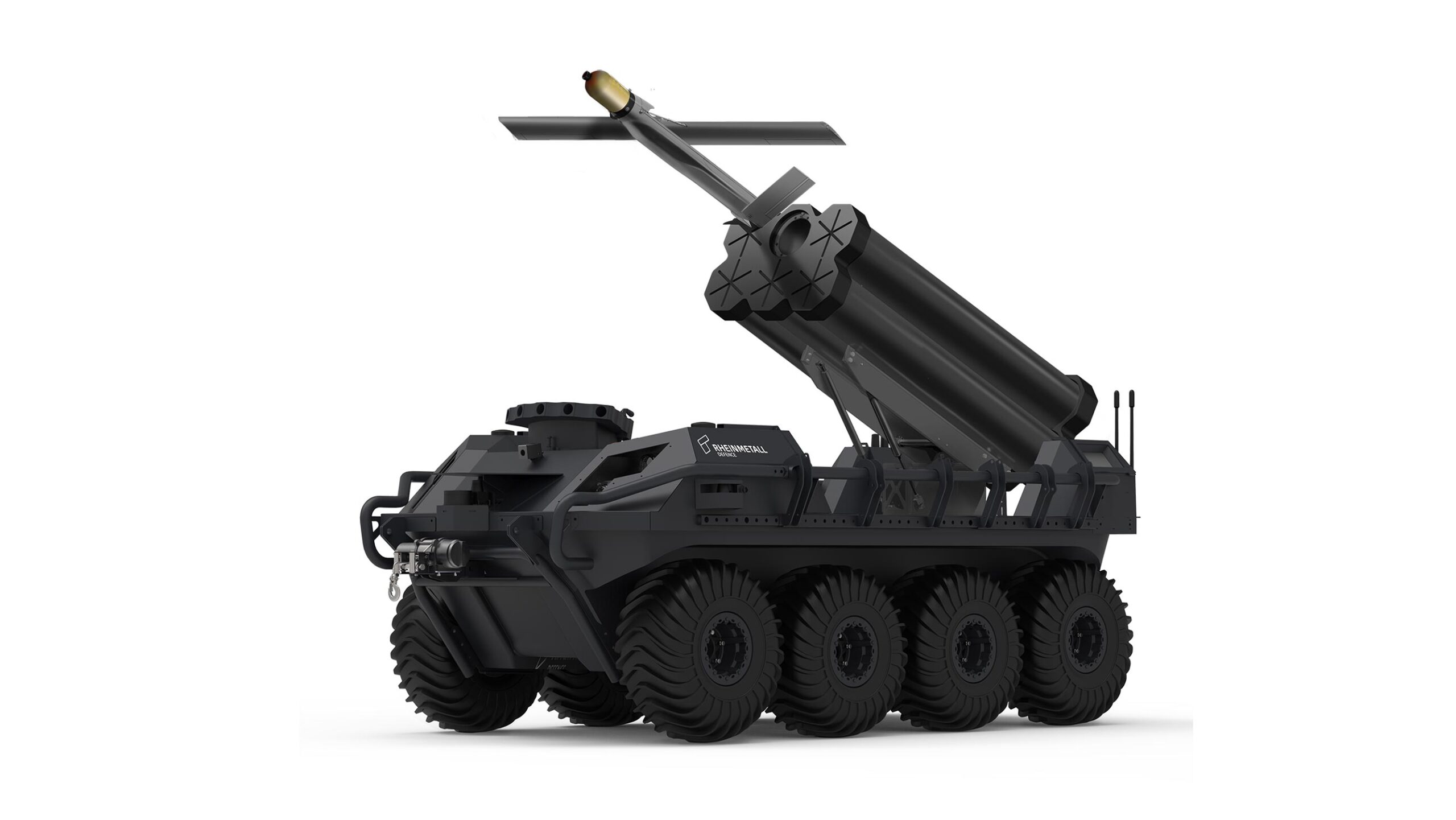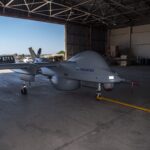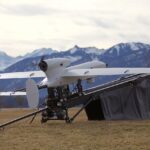In Unterlüß, 600 antimilitarists demonstrated against Rheinmetall. At the same time, the company presented a new weapon system. The combination of a flying drone and a land drone should be able to fight enemy targets in swarms in the future. A company boss praises the system as a “surgical strike with minimal collateral damage”.
Rheinmetall intends to expand modern warfare with unmanned land vehicles. The German armaments group has developed a drone tank that is about to go into series production and is to be sold worldwide. The “Mission Master” is designed for surveillance, troop transport or recovery of wounded behind enemy lines. It can also be armed with 70 mm rocket launchers from the French company Thales to support battles.
As an Unmanned Ground Vehicle (UGV), the combat robot can be operated remotely, semi-automatically or fully autonomously with a programmed routine. The system is powered by an electric motor and can operate for up to eight hours. The “Mission Master” weighs 750 kilograms and can carry up to 600 kilograms, with a low payload the vehicle can allegedly also swim.
“Loitering munition”
At an armaments fair in Kielce, Poland, this week Rheinmetall unveiled its drone tank for the first time with a launcher for kamikaze drones. These “Warmate” are so-called “loitering ammunition”, which initially circles over the enemy territory and provides surveillance images. The drone is then directed into the target and destroys itself. Rheinmetall calls the weapon a “surgical attack with minimal collateral damage”.
The armor-piercing “Warmate” is manufactured by the Polish WB Group and has a length of about one meter, the wingspan is 140 centimeters. It therefore belongs to the class of microdrones. According to the manufacturer, it has a range of around 10 kilometers and can remain in the air for up to 30 minutes. The Polish army has already ordered 1,000 “Warmate”.The company is said to export as well to Ukraine and the United Arab Emirates.
Control with soldier system “Argus”
The WB Group promotes the weapon as fully autonomous, but once programmed attacks can be aborted or redirected. The manufacturer does not specify the explosive charge. The targets are approached using laser target finders. Rheinmetall also sells these laser markers which are purchased by the German armed forces. They are used mobile by soldiers on the ground, but can also be mounted on aircraft or drones.
Attacks with kamikaze drones can also take place in swarms, with missions coordinated by a ground station. Control is also possible with the help of the portable “Argus” system, which Rheinmetall markets for NATO under the name “Argus” as the digital soldier system “Infantryman of the Future”.
No WABEP for the Bundeswehr
By 2011, Rheinmetall had also developed a system with “loitering munition” for the German Bundeswehr. This WABEP consists of two different drones. Rheinmetall’s KZO is used for military reconnaissance. Marked targets are then destroyed with a “Harop” from Israeli manufacturer Israel Aerospace Industries (IAI). On behalf of the German armed forces, Rheinmetall carried out “practical tests and flight trials” with the WABEP, including convoy escort, the “deactivation” of enemy systems and attacks on vehicles in motion. According to the Ministry of Defence, the fight against “particularly important targets” was also rehearsed.
According to the 2009 Bundeswehr Plan, the German Ministry of Defence wanted to procure two WABEP systems, each with 42 drones and the necessary ground stations, and was scheduled to be operational from 2013. In the end, however, the German government decided against procuring WABEP. Without the additional kamikaze drone, the Bundeswehr has procured KZO since 2005, but it will no longer be reordered. The Israeli arms company IAI, on the other hand, continues to sell the “Harop”. The military in Azerbaijan, for example, is using it to bomb Armenian troops.
Protests in Unterlüß
Rheinmetall manufactures the drone tank at a plant in Canada. A military magazine reports on orders from “Italy and the Middle East”, and the Bundeswehr has also procured a device for initial tests. The system is based on technology from the Canadian robot manufacturer Provectus, which Rheinmetall recently acquired in full. Rheinmetall’s automotive and defence divisions will also benefit from the new company.
Rheinmetall has more than 120 sites worldwide and reports growing profits. At the company’s headquarters in Unterlüß, Lower Saxony, where the group produces ammunition and military vehicles, anti-militarist activists ended a ten-day camp this weekend. Foreign war opponents were also guests, including those from Sardinia and South Africa, where Rheinmetall produces ammunition for Saudi Arabia and other countries. Around 250 people took part in the blockades, which lasted several days, and around 600 came to Unterlüß today for the final nationwide demonstration.
Image: All rights reserved Rheinmetall.




